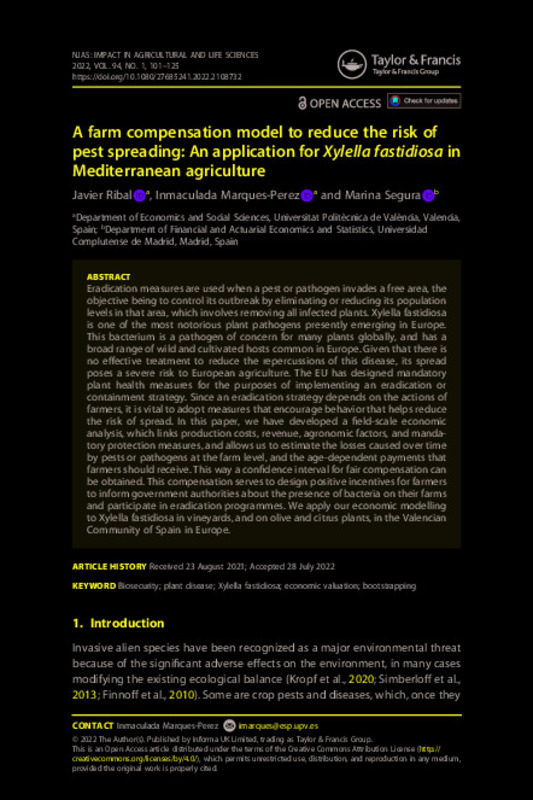JavaScript is disabled for your browser. Some features of this site may not work without it.
Buscar en RiuNet
Listar
Mi cuenta
Estadísticas
Ayuda RiuNet
Admin. UPV
A farm compensation model to reduce the risk of pest spreading: An application for Xylella fastidiosa in Mediterranean agriculture
Mostrar el registro sencillo del ítem
Ficheros en el ítem
| dc.contributor.author | Ribal, Javier
|
es_ES |
| dc.contributor.author | Marques-Perez, Inmaculada
|
es_ES |
| dc.contributor.author | Segura, Marina
|
es_ES |
| dc.date.accessioned | 2023-10-17T18:01:13Z | |
| dc.date.available | 2023-10-17T18:01:13Z | |
| dc.date.issued | 2022-12-31 | es_ES |
| dc.identifier.uri | http://hdl.handle.net/10251/198243 | |
| dc.description.abstract | [EN] Eradication measures are used when a pest or pathogen invades a free area, the objective being to control its outbreak by eliminating or reducing its population levels in that area, which involves removing all infected plants. Xylella fastidiosa is one of the most notorious plant pathogens presently emerging in Europe. This bacterium is a pathogen of concern for many plants globally, and has a broad range of wild and cultivated hosts common in Europe. Given that there is no effective treatment to reduce the repercussions of this disease, its spread poses a severe risk to European agriculture. The EU has designed mandatory plant health measures for the purposes of implementing an eradication or containment strategy. Since an eradication strategy depends on the actions of farmers, it is vital to adopt measures that encourage behavior that helps reduce the risk of spread. In this paper, we have developed a field-scale economic analysis, which links production costs, revenue, agronomic factors, and mandatory protection measures, and allows us to estimate the losses caused over time by pests or pathogens at the farm level, and the age-dependent payments that farmers should receive. This way a confidence interval for fair compensation can be obtained. This compensation serves to design positive incentives for farmers to inform government authorities about the presence of bacteria on their farms and participate in eradication programmes. We apply our economic modelling to Xylella fastidiosa in vineyards, and on olive and citrus plants, in the Valencian Community of Spain in Europe. | es_ES |
| dc.description.sponsorship | This work was funded by Generalitat Valenciana. Conselleria de Agricultura, Desarrollo Rural, Emergencia Climatica y Transicion Ecologica. | es_ES |
| dc.language | Inglés | es_ES |
| dc.publisher | Taylor & Francis | es_ES |
| dc.relation.ispartof | NJAS: Impact in Agricultural and Life Sciences | es_ES |
| dc.rights | Reconocimiento (by) | es_ES |
| dc.subject | Biosecurity | es_ES |
| dc.subject | Plant disease | es_ES |
| dc.subject | Xylella fastidiosa | es_ES |
| dc.subject | Economic valuation | es_ES |
| dc.subject | Bootstrapping | es_ES |
| dc.subject.classification | ECONOMIA, SOCIOLOGIA Y POLITICA AGRARIA | es_ES |
| dc.subject.classification | ECONOMIA FINANCIERA Y CONTABILIDAD | es_ES |
| dc.title | A farm compensation model to reduce the risk of pest spreading: An application for Xylella fastidiosa in Mediterranean agriculture | es_ES |
| dc.type | Artículo | es_ES |
| dc.identifier.doi | 10.1080/27685241.2022.2108732 | es_ES |
| dc.rights.accessRights | Abierto | es_ES |
| dc.contributor.affiliation | Universitat Politècnica de València. Facultad de Administración y Dirección de Empresas - Facultat d'Administració i Direcció d'Empreses | es_ES |
| dc.description.bibliographicCitation | Ribal, J.; Marques-Perez, I.; Segura, M. (2022). A farm compensation model to reduce the risk of pest spreading: An application for Xylella fastidiosa in Mediterranean agriculture. NJAS: Impact in Agricultural and Life Sciences. 94(1):101-125. https://doi.org/10.1080/27685241.2022.2108732 | es_ES |
| dc.description.accrualMethod | S | es_ES |
| dc.relation.publisherversion | https://doi.org/10.1080/27685241.2022.2108732 | es_ES |
| dc.description.upvformatpinicio | 101 | es_ES |
| dc.description.upvformatpfin | 125 | es_ES |
| dc.type.version | info:eu-repo/semantics/publishedVersion | es_ES |
| dc.description.volume | 94 | es_ES |
| dc.description.issue | 1 | es_ES |
| dc.identifier.eissn | 2768-5241 | es_ES |
| dc.relation.pasarela | S\472566 | es_ES |
| dc.contributor.funder | Generalitat Valenciana | es_ES |
| dc.contributor.funder | Universitat Politècnica de València | es_ES |
| dc.subject.ods | 02.- Poner fin al hambre, conseguir la seguridad alimentaria y una mejor nutrición, y promover la agricultura sostenible | es_ES |
| dc.subject.ods | 15.- Proteger, restaurar y promover la utilización sostenible de los ecosistemas terrestres, gestionar de manera sostenible los bosques, combatir la desertificación y detener y revertir la degradación de la tierra, y frenar la pérdida de diversidad biológica | es_ES |
| upv.costeAPC | 2675 | es_ES |








